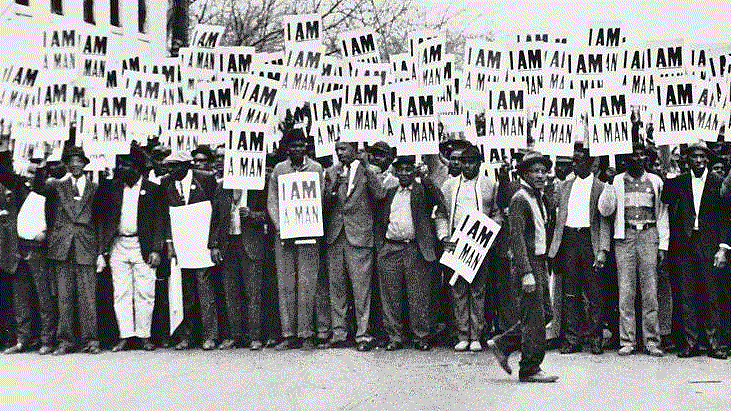Most Californians Oppose Cash Reparations for Slave Descendants, IGS Poll Finds
Voter attitudes suggest campaigns for compensation "will face a steep uphill climb.”

Ernest Withers via St. Lawrence University Art Gallery / Flickr
California voters are broadly opposed to paying the state’s Black residents to compensate for the longstanding harms of slavery, with opposition extending across party lines, according to a new poll released by the UC Berkeley Institute of Governmental Studies.
The IGS Poll found that 60% of Californians acknowledge the deep and continuing human damage caused by centuries of slavery and the segregation and persecution of Black people that continued long after slavery legally ended in 1865. But strong majorities of conservative and independent voters — and a slight majority of liberals — oppose cash payments to the descendants of slaves as recommended in June by Gov. Gavin Newsom’s Reparations Task Force.
“The findings reveal the racial and political contradictions of California voters,” said G. Cristina Mora, a Berkeley sociologist and IGS co-director. “While many can empathize with the plight of Black Americans, not all of these feelings will translate into support for policies that address longstanding racial harms. … The fact that even liberals are divided indicates that campaigns for racial redress will face a steep uphill climb.”
The Reparations Task Force early this summer released a 1,100-page report documenting the devastating impacts of slavery on California’s contemporary Black residents. The task force did not make specific financial recommendations, but analysts for the panel estimated that compensation for a range of harms could surpass $1 million for each descendant of slaves or of free Black people living in the U.S. before 1900.
While many can empathize with the plight of Black Americans, not all of these feelings will translate into support for policies that address longstanding racial harms.
- G. Cristina Mora
Nearly 160 years after its legal abolition at the end of the Civil War, slavery remains “embedded in the political, legal, health, financial, educational, cultural, environmental, social, and economic systems of the United States of America,” the authors wrote. “Racist, casteist, untrue, and harmful stereotypes created to support slavery continue to physically and mentally harm African Americans today.
“Without a remedy specifically targeted to dismantle our country’s racist foundations and heal the injuries inflicted by colonial and American governments,” the report concluded, “the ‘badges and incidents of slavery’ will continue to harm African Americans in almost all aspects of American life.”
While a majority of the 6,030 registered California voters surveyed for the IGS Poll agree that the legacy of slavery continues to impose a toll on Black residents, opinions diverge along starkly partisan lines.
Among Democrats, 80% agree that slavery continues to have an impact, and 59% of voters with no party preference see continuing harms. Among Republicans, however, nearly 70% see no lasting impact at all from slavery, while 12% say slavery’s aftermath today affects Black Californians only “a little.”
But on the question of paying cash reparations to qualified Black residents, the poll found disagreement across party and racial lines.
A large majority of Black poll respondents favor reparations: 76% in all, with 55% expressing strong support.
But among Latinx, Asian/Pacific Islander and white respondents, only a quarter favor cash payments. Strong majorities in all three groups — including 65% of white voters — oppose reparations.
Democrats were evenly divided, with neither camp reaching 50%; just 24% of those with no party preference are in agreement. Republicans are “nearly unanimously opposed” to reparation payments, the IGS Poll found, with only 3% in favor.
Even among younger voters who are traditionally more liberal, only a third of those 18 to 39 favor the payments.
Why are so many opposed? While voters cite several objections, they appear to focus on perceived fairness.
Sixty percent say it’s unfair to ask today’s taxpayers to compensate victims of past wrongs, and 53% object that it’s not fair to single out the descendants of slaves for reparations when other racial and religious groups also have been wronged in the past.
The IGS Poll found that significant minorities of those polled have not heard of the state task force or its recommendations. Just 46% of Latinx respondents and 50% of Asian/Pacific Islanders are aware of the effort.
The IGS Poll was administered online in English and Spanish from August 24-29, 2023. The margin of error is approximately two percentage points.
